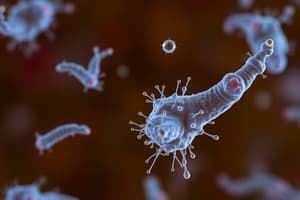Podcast
Questions and Answers
किस तरह के माइक्रो-ऑर्गेनिज्म अर्किया होते हैं?
किस तरह के माइक्रो-ऑर्गेनिज्म अर्किया होते हैं?
बैक्टीरिया के समान, लेकिन विशेष गुणों वाले
क्या है वायरस का सरल ढंग से संरचना?
क्या है वायरस का सरल ढंग से संरचना?
न्यूक्लिक एसिड और प्रोटीन कोट
माइक्रो-ऑर्गेनिज्म का मानव स्वास्थ्य पर क्या प्रभाव होता है?
माइक्रो-ऑर्गेनिज्म का मानव स्वास्थ्य पर क्या प्रभाव होता है?
मानव स्वास्थ्य पर माइक्रो-ऑर्गेनिज्म का प्रभाव मानव के स्वास्थ्य पर महत्वपूर्ण होता है, दोनों सकारात्मक और नकारात्मक रूप से।
माइक्रो-ऑर्गेनिज्म से होने वाली किसी बीमारी का उदाहरण दें।
माइक्रो-ऑर्गेनिज्म से होने वाली किसी बीमारी का उदाहरण दें।
माइक्रो-ऑर्गेनिज्म की किस प्रकार की भूमिका होती है?
माइक्रो-ऑर्गेनिज्म की किस प्रकार की भूमिका होती है?
माइक्रोबायोलॉजी क्या है?
माइक्रोबायोलॉजी क्या है?
बैक्टीरिया क्या हैं और वे कहाँ पाए जाते हैं?
बैक्टीरिया क्या हैं और वे कहाँ पाए जाते हैं?
वायरस क्या हैं और वे क्या कर सकते हैं?
वायरस क्या हैं और वे क्या कर सकते हैं?
माइक्रोबायोलॉजी के क्षेत्र में किस प्रकार के जीवाणुओं का अध्ययन किया जाता है?
माइक्रोबायोलॉजी के क्षेत्र में किस प्रकार के जीवाणुओं का अध्ययन किया जाता है?
जीवाणुओं का महत्व क्या है, और उनका मानव स्वास्थ्य और पर्यावरण पर क्या प्रभाव हो सकता है?
जीवाणुओं का महत्व क्या है, और उनका मानव स्वास्थ्य और पर्यावरण पर क्या प्रभाव हो सकता है?
Study Notes
Biology: An Introduction to the Study of Life
Biology is the science of life, encompassing all the different aspects of life on Earth. From the smallest organisms to the largest ecosystems, biology seeks to understand the processes, interactions, and evolution of living organisms. One of the essential branches of biology is microbiology, which focuses on the study of microorganisms and their interactions with other organisms and the environment.
Microbiology: The Study of Microorganisms
Microbiology is the branch of biology that deals with the study of microorganisms, which are organisms that are too small to be seen with the naked eye. These organisms include bacteria, viruses, fungi, archaea, and protozoa. Microorganisms play a crucial role in various biological processes, and they can have both positive and negative impacts on human health and the environment.
Bacteria
Bacteria are single-celled microorganisms that can be found in various environments, including soil, water, and the human body. They are diverse in their morphology, metabolism, and mode of nutrition. Some bacteria are beneficial to humans, such as those that help in the production of various foods and beverages, while others can cause diseases like tuberculosis, cholera, and food poisoning.
Viruses
Viruses are non-cellular microorganisms that can infect various types of cells and cause diseases in plants, animals, and humans. They are much smaller than bacteria and have a simple structure, consisting of nucleic acid and a protein coat. Viruses can cause diseases like the flu, common cold, and HIV/AIDS.
Fungi
Fungi are eukaryotic microorganisms that can be found in various environments, including soil, water, and the human body. They play a crucial role in various biological processes, such as decomposition of organic matter, production of antibiotics, and synthesis of vitamins. Fungi can cause diseases in plants and animals, such as ringworm, athlete's foot, and thrush.
Archaea
Archaea are microorganisms that are similar to bacteria but have unique properties that distinguish them from other types of microorganisms. They are found in extreme environments, such as hot springs, deep-sea hydrothermal vents, and radioactive waste sites. Archaea play a crucial role in various biological processes, such as methane production, ammonia oxidation, and sulfate reduction.
Protozoa
Protozoa are unicellular eukaryotic microorganisms that can be found in various environments, including soil, water, and the human body. They play a crucial role in various biological processes, such as decomposition of organic matter, nutrient cycling, and symbiotic relationships. Protozoa can cause diseases in humans, such as malaria, African sleeping sickness, and Chagas disease.
Impact of Microorganisms on Human Health
Microorganisms have a significant impact on human health, both positively and negatively. Some microorganisms are beneficial to humans, such as bacteria that help in the production of various foods and beverages, while others can cause diseases like tuberculosis, cholera, and food poisoning. Viruses, such as the flu virus, can cause respiratory infections, while bacteria like Streptococcus pyogenes can cause skin infections.
Conclusion
Biology is the science of life, and microbiology is an essential branch of biology that deals with the study of microorganisms. Microorganisms play a crucial role in various biological processes and have a significant impact on human health. Understanding microbiology can help us harness the potential of these organisms for beneficial purposes while minimizing their negative impacts.
Studying That Suits You
Use AI to generate personalized quizzes and flashcards to suit your learning preferences.
Description
Explore the world of microbiology and the study of microorganisms. Learn about bacteria, viruses, fungi, archaea, and protozoa, and understand their impact on human health and the environment. Discover the positive and negative roles of microorganisms in various biological processes.




